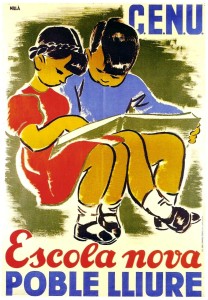Le Vernet concentration camp
Arthur Koestler, Le Vernet concentration camp, Toulouse 1939.
A percentage of the continent’s population had become quite accustomed to the thought that they were outcasts. They could be divided into two main categories: people doomed by biological accident of their race and people doomed for their metaphysical creed or rational conviction regarding the best way to organise human welfare. The latter category included the progressive elite of the intelligentsia, the middle classes and the working classes in Central, Southern and Eastern Europe.
Helen Graham:
Thus wrote Arthur Koestler from his own internment in Le Vernet concentration camp near Toulouse which was “rehabilitated” by the Daladier government to intern International Brigaders who had crossed into France with the defeated Spanish Republican army after the fall of Catalonia in February 1939. Unlike the beach internment camps, such as Argelès, St Cyprien and Le Barcarès, which were hastily set up to contain the Spanish refugees, Le Vernet, like Gurs and a small number of the other camps across the south-west, was expressly conceived as a punishment or disciplinary camp. So while those refugees in the beach camps suffered appalling conditions, especially at the start, through the sheer lack of basic facilities and even shelter, in Le Vernet the inmates were subjected to an explicit prison regime – which of course says much about how the French government viewed the brigaders. More here
Isidre Nonell “Returned Soldier from Cuba on the Quay”
M&Ms and the Spanish Civil War
An odd one. Apparantly the idea for M&Ms were modeled after chocolates that the man behind Mars, Forrest Mars Sr, had discovered while in Spain during the during the Civil War. It seems that Forrest got the idea when he saw soldiers eating a pieces of chocolate covered with a crisp sugar coating—the chocolate pieces did not melt in the hot temperatures at the front…I don’t know on which the side the soldiers were on. More here
1938 Glasgow Spanish Civil War banner
Banner “Spanish Workers Dying for Democracy ” made in Scotland in 1938 and hanging now in the People’s Palace museum, Glasgow. Found it on Wikipedia.
From The Glasgow Story
“A banner of the Govan Branch of the Scottish Socialist Party (SSP) from 1938. The Scottish Socialist Party was founded by Patrick Dollan in 1933 as an alternative to the Independent Labour Party. It merged with the Labour Party in 1940.
When the Spanish Civil War broke out in 1936 the SSP supported the democratically-elected Republican Government against the rebel Spanish Army and Nationalist factions. This propaganda banner depicts Spanish workers armed only with spades and pickaxes facing up to the well-equipped Spanish Army. The SSP was critical of the British Government for its refusal to permit British suppliers to supply arms to the Republicans.
The text to the left of the banner draws a comparison between the Spanish Republicans and Scots Thomas Muir (transported in 1794), John Baird and Andrew Hardie (both executed 1820), who suffered for their political beliefs.”
Augustí Centelles on Orwell
Francesc Ferrer i Guàrdia
Demonstration in France, Paris I think, denouncing the judicial murder of the founder of the Modern School the libertarian thinker Francesc Ferrer i Guàrdia. He was executed in Montjuic Castle, Barcelona for his alleged role in the 1909 Tragic Week, though he was almost certainly innocent There were also large protests in London and elsewhere.
Stuart Christie interview
Well worth listening to this frank 15 minute Radio 4 interview with Stuart Christie “In 1964 a young Scot called Stuart Christie joined a plot to assassinate the Spanish dictator General Francisco Franco. He had become friends with Spanish exiles living in London and was keen to help end Franco’s rule. But the plot failed and Christie ended up in jail. He has been telling his story to Mike Lanchin. ” BBC Radio 4
Thanks to Christine of stillcause for flagging this.
The United New School Board
One of the revolutionary changes in Catalonia during the war, was the establishment of the CENU (Consell de l’Escola Nova Unificada) school board on 27 July 1936 which provided free, secular, mixed education for ALL, including to my knowledge the creation of the first free public nurseries in Spain.
We could do with going back to this universal system today, instead of the elitist public/semi-private/private modal which dominates today in Catalonia.
Spanish Republicans in the Channel Islands
Some 4,000 Spanish Republicans were deported by the Nazis to the occupied Channel Islands and were forced to work building fortifications; only 59 survived. From Paul Preston’s “The Spanish Civil War: Reaction, Revolution, and Revenge“






